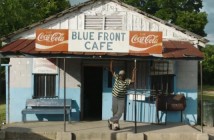
Editor’s Note: The following review is part of our coverage of TIFF’s winter film series On the Road: The Films of Wim Wenders. For more information, visit tiff.net and follow TIFF on Twitter at @TIFF_NET.
Tokyo-Ga (1985), Wim Wenders’ documentary of his trip to Japan in search of the world seen in the films of famed director Yasujirô Ozu, is a charming and unique tribute to one of the greatest film directors of all time. Described by Vincent Canby on its American premiere as a “small but important film,” thirty years on, with greater access to Ozu’s films and the expansion of Wenders’ own filmography, Tokyo-Ga no longer seems like such a small film. At the same time, it doesn’t seem as important, either. Though heartfelt and frequently delightful, it reveals much less about Ozu and Wenders than it promises.
Wenders was very likely trying to convince himself of his own emotions, not convince us, and one has to at least admire his willingness to put his own uncertainty out there for public consumption.
Wenders once described Tokyo-Ga as his “filmed diary,” and indeed his long, airy shots of trains, alleyways, pachinko parlors and bobby soxers evoke the curiosity of a traveler eager to experience the new, but who finds himself homesick and alone. With a desire to experience the unusual, on one hazy day, Wenders visits golf stadiums, which were very much en vogue in Tokyo in the early 1980s, and the next morning begins a day-long vigil in a factory that makes wax food replicas. He frequently allows silence to reign, letting the images to speak for themselves, and approaches everything with his trademark childlike wonder.
 Unfortunately, it’s only a short ride from childlike to childish, and Wenders’ tendency here to over-sell his emotions reveals an unappealing immaturity. As he narrates his afternoon at a gorgeous, shady cemetery, he speaks reverently about the sound of ravens, and the film dutifully provides several seconds of caws to emphasize the point. Later, he pontificates at length about truth and perception and the role of the artist, and as he indulges in a metaphor about a child waving, a child’s head pops up in a train window. Moments later, she waves, just in case those of us in the audience had forgotten what it looked like when a kid waves goodbye.
Unfortunately, it’s only a short ride from childlike to childish, and Wenders’ tendency here to over-sell his emotions reveals an unappealing immaturity. As he narrates his afternoon at a gorgeous, shady cemetery, he speaks reverently about the sound of ravens, and the film dutifully provides several seconds of caws to emphasize the point. Later, he pontificates at length about truth and perception and the role of the artist, and as he indulges in a metaphor about a child waving, a child’s head pops up in a train window. Moments later, she waves, just in case those of us in the audience had forgotten what it looked like when a kid waves goodbye.
Chishû Ryû, the celebrated actor who appeared in nearly all of Ozu’s films, and Yûharu Atsuta, Ozu’s longtime assistant and cameraman, provide insights into the mechanics of making an Ozu film, as well as their memories of the man himself, making Tokyo-Ga very much worthwhile.
That’s perhaps a bit unfair; Wenders was very likely trying to convince himself of his own emotions, not convince us, and one has to at least admire his willingness to put his own uncertainty out there for public consumption. It’s almost a brave thing for him to do, considering the pure, unencumbered emotion that pours forth from two of Ozu’s colleagues interviewed for the film: Chishû Ryû, the celebrated actor who appeared in nearly all of Ozu’s films, and Yûharu Atsuta, Ozu’s longtime assistant and cameraman. Their insights into the mechanics of making an Ozu film, as well as their memories of the man himself, make Tokyo-Ga very much worthwhile.
There’s also a brief appearance from Wenders’ fellow filmmaker Werner Herzog, who is as entertainingly bitter as one would expect, and full of humblebrags. Both lament the loss of Ozu’s world, though Ozu filmed so much in domestic interiors built on soundstages that at times it’s difficult to suss out what exactly it is they’re looking for.
Most of the time, what Wenders finds is an aspect of Japanese culture that mimics American culture, something he then uses as a springboard for another lament about the loss of Ozu’s world. Despite Herzog’s unambiguous comments about having to dig like an archaeologist to get to lost worlds, and Wenders’ own observation that cinematographer-director Chris Marker, whom he visits briefly, had access to a Tokyo Wenders never even got close to, Wenders doesn’t seem to quite understand what he’s being told. Maybe Ozu’s world wasn’t lost; maybe Wenders just never looked in the right places.
Thought lighter on revelations than it promises, Tokyo-Ga is Wim Wenders' charming and heartfelt tribute to master director Yasujirô Ozu.



